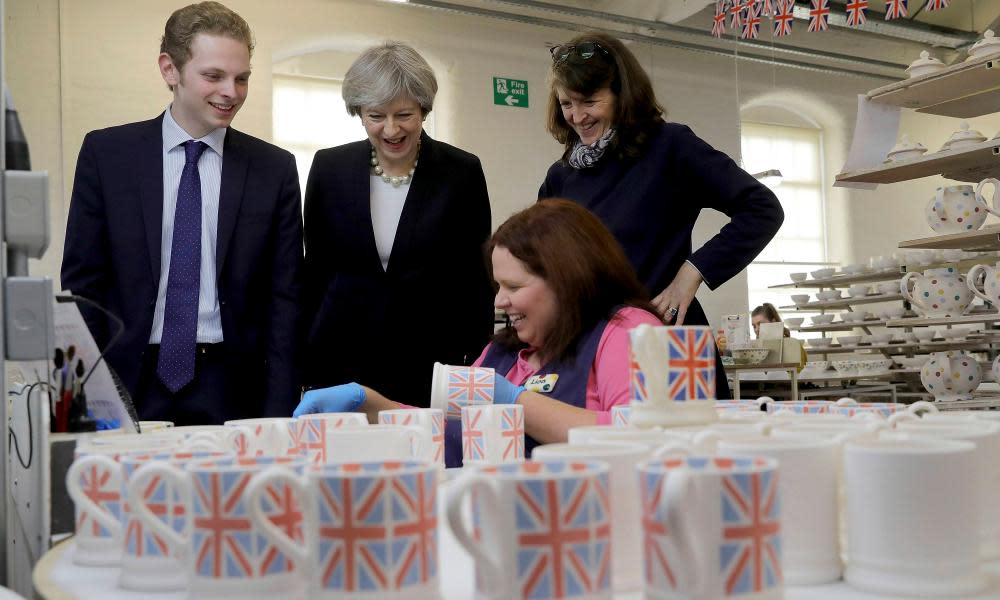More than politics, Theresa May’s true strength is her grasp of British culture | Rafael Behr

So John Major and Tony Blair are on the same team now. It could be one of those movies that give ageing Hollywood action heroes a valedictory outing (in cinema-trailer bass). “Once they were rivals. Everyone thought they were out of the game. But there was one last job to do, and this time they’d be in it together…”
And the award for best political comeback goes to Beating Brexit. No, wait! Wrong envelope. In a speech on Monday, John Major questioned Theresa May’s technique for removing Britain from the EU. Impatient stomping towards the exit while ramping up unrealistic expectations reduces the chances of getting a good deal and makes an imperfect one hard to sell. Blair made a companion argument last week, urging those alarmed by the current national trajectory to campaign for a different one.
Both former prime ministers also identified new inclemency in the political weather – a hailstorm of intolerance that batters the Euro-dissenter with accusations of elitism, hatred of democracy, depleted patriotism. The point was proved by Brexiteers’ personalised attacks on Major and Blair within hours of their interventions. None engaged in the substance of the speeches. The line was that right-thinking people must despise execrable running dogs of the discredited pro-Brussels junta, now plotting in exile.
Many tides have risen and fallen to beach Blair and Major on the same political shore. It will soon be the 20th anniversary of New Labour’s landslide victory. That was not just an electoral upheaval: it was a generational pivot. And it felt culturally seismic in a way that subsequent elections did not, but last June’s referendum did.
UK culture wars are not as noisy and persistent as American ones. We don’t badge ourselves with polarised views on abortion, Darwin, guns or whatever our equivalent issues might be. It isn’t the British style, which means important trends sometimes go unremarked.
Culture and identity tend to be treated as peripheral expressions of whatever is happening in the economy, which is sometimes true but not always. May understands that. She is a more astute culture warrior than economist, and for now that is serving her well.
May grasped sooner than many Tories that Blairism had entrenched a new cultural settlement, casting Conservatism as mean-spirited and electorally nonviable. She took flak for admitting to the “nasty party” image in 2002, but thereby laid foundations for David Cameron’s project of brand decontamination. She understood the social dynamics of New Labour’s victory better than the victorious party, which often looked shifty in power, as if still questioning its entitlement to be there – still quaking from the trauma of unexpected defeat by Major in 1992.
Cultural conservatives took a while to realise how marginal they had become and how derided they were by the new mainstream. But doyens of the new mainstream also failed to grasp that they were an establishment now, even if they didn’t feel like one.
The 1997-2010 administration did not dismantle old hierarchies, but nor was it just a prolonged exercise in Tory seat-warming. It oversaw the final stages of a campaign against deference and repressive moralism variously expressed since the 1950s by angry young men on the stage, shaggy-haired rock’n’rollers on the radio, women’s lib, gay rights and antiracism marchers, alternative comedians and commissioners of “edgy” drama on Channel 4. And yet, despite many victories, liberal culture warriors never lost a sense of themselves as rebels with a duty to affront – even offend – traditional attitudes wherever they lurked.
To win power from New Labour, Cameron adapted to Blairish mode: self-consciously modern, socially liberal, metropolitan and relaxed about Europe. It is arresting to think how recently the very idea of taking Britain out of the EU was dismissed by a Conservative leader as the fixation of retired majors, golf-club bores and fringe-dwelling racists.
Just as winners and losers after 1997 struggled to adapt to their new positions, the acceptance of new roles post-2016 is going to take time. Just as some liberals once resisted their status as a cultural elite, there is a tendency among Brexiteers now to flee the responsibility contained in their victory.
There was always something absurd about “anti-establishment” language in the plummy tones of Boris Johnson or Nigel Farage. But their campaign did capture a rebellious spirit. Partly it was generalised frustration at the state of everything; partly it was counter-revolution – the backlash by people who sensed that their lives, interests and anxieties were the punchline to a joke at a fancy London dinner party.
Imagining himself as the figurehead of a revolt, Farage can’t drop the confrontational stance. He wants mainstream recognition as the author of Brexit. He wants a knighthood. Yet he also wants licence to be the perpetual rebel; always testing boundaries with “politically incorrect” transgression.
The reactionaries won’t admit they’ve won, and the liberals haven’t grasped the scale of their defeat. That is good for May, who navigates through the middle. She read the cultural mood when it was against her party in opposition. Now she co-opts a different mood as her personal project in power. That doesn’t mean she will make a success of Brexit, as she promises. The real process hasn’t even begun. The economy will soon enough be the big theme in politics again. Then the warnings issued by two former prime ministers might resonate. But for now, it is culture wars that dominate, and the current prime minister who commands the field.

 Yahoo News
Yahoo News 
